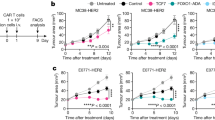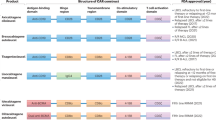Abstract
In vivo and in vitro studies suggest human growth hormone (hGH) receptors on bone marrow stem cells may be biologically active and could be exploited to promote haemopoetic recovery after intensive chemotherapy. Patients with haematological malignancies receiving intensive chemotherapy and requiring hospitalization were randomized in a double-blind, placebo-controlled single-centre trial. Patients were randomly assigned to receive either hGH 500 μg/day or placebo, for 6 weeks. There was no significant difference in patient characteristics at baseline between the placebo and treatment arms. Patients treated with hGH showed significantly faster recovery of platelets to 25 × 109/l (median of 16 versus 19 days; P=0.03) compared to the placebo-controlled arm (hazard ratio 1.47 favouring hGH, 95% confidence interval (CI), 1.03–2.08). Time to relapse did not differ significantly between arms. There was no change in the anthropometric parameters at the start and end of hGH/placebo therapy. The study drug was well tolerated. Treatment with hGH in physiological doses improves platelet recovery, but is not associated with a lower relapse rate or improved anthropometric parameters in patients receiving intensive chemotherapy.
This is a preview of subscription content, access via your institution
Access options
Subscribe to this journal
Receive 12 print issues and online access
$259.00 per year
only $21.58 per issue
Buy this article
- Purchase on Springer Link
- Instant access to full article PDF
Prices may be subject to local taxes which are calculated during checkout




Similar content being viewed by others
References
Golde DW, Bersch N, Li CH . Growth hormone: species-specific stimulation of erythropoiesis in vitro. Science 1977; 196: 1112–1113.
Merchav S, Tatarsky I, Hochberg Z . Enhancement of erythropoiesis in vitro by human growth hormone is mediated by insulin-like growth factor I. Br J Haematol 1988; 70: 267–271.
Murphy WJ, Tsarfaty G, Longo DL . Growth hormone exerts hematopoietic growth-promoting effects in vivo and partially counteracts the myelosuppressive effects of azidothymidine. Blood 1992; 80: 1443–1447.
Tian ZG, Woody MA, Sun R, Welniak LA, Raziuddin A, Funakoshi S et al. Recombinant human growth hormone promotes hematopoietic reconstitution after syngeneic bone marrow transplantation in mice. Stem Cells 1998; 16: 193–199.
Carlo-Stella C, Di Nicola M, Milani R, Guidetti A, Magni M, Milanesi M et al. Use of recombinant human growth hormone (rhGH) plus recombinant human granulocyte colony-stimulating factor (rhG-CSF) for the mobilization collection of CD34+ cells in poor mobilizers. Blood 2004; 103: 3287–3295.
Schambelan M, Mulligan K, Grunfeld C, Daar ES, LaMarca A, Kotler DP et al. Recombinant human growth hormone in patients with HIV-associated wasting. A randomized, placebo-controlled trial. Serostim Study Group. Ann Intern Med 1996; 125: 873–882.
Waters D, Danska J, Hardy K, Koster F, Qualls C, Nickell D et al. Recombinant human growth hormone, insulin-like growth factor I and combination therapy in AIDS associated wasting: a randomised double-blind placebo-controlled trial. Ann Intern Med 1996; 125: 865–872.
Paton N, Newton P, Sharpstone D, Ross HM, Cotton J, Calder AG et al. Short-term growth hormone administration at the time of opportunistic infections in HIV-positive people. AIDS 1999; 13: 195–202.
Cherbonnier C, Déas O, Carvalho G, Vassal G, Durrbach A, Haeffner A et al. Potentiation of tumour apoptosis by human growth hormone via glutathione production and decreased NF-κB activity. Br J Cancer 2003; 89: 1108–1115.
Lerebours E, Tilly H, Rimbert A, Delarue J, Piguet H, Colin R . Changes in energy and protein status during chemotherapy in patients with acute leukaemia. Cancer 1988; 61: 2412–2417.
Couto-Silva AC, Trivin C, Esperou H, Michon J, Fischer A, Brauner R . Changes in height, weight and plasma leptin after bone marrow transplantation. Bone Marrow Transplant 2000; 26: 1205–1210.
Osoba D, Murray N, Gelmon K, Karsai H, Knowling M, Shah A et al. Quality of life, appetite and weight change in patients receiving dose-intensive chemotherapy. Oncology (Williston Park) 1994; 8: 61–65.
Kumar R, Marwaha RK, Bhalla AK, Gulati M . Protein energy malnutrition and skeletal muscle wasting in childhood acute lymphoblastic leukaemia. Indian Paediatr 2000; 37: 720–726.
Mehta J, Powles R, Treleaven J, Swansbury GJ, Kulkarni S, Saso R et al. The impact of karyotyping on remission rates in adult patients with de novo acute myeloid leukemia receiving high-dose cytarabine-based induction chemotherapy. Leuk Lymph 1999; 34: 553–560.
Kell WJ, Burnett AK, Chopra R, Yin JA, Clark RE, Rohatiner A et al. A feasibility study of simultaneous administration of gemtuzumab ozogamicin with intensive chemotherapy in induction and consolidation in younger patients with acute myeloid leukemia. Blood 2003; 102: 4277–4283.
Powles R, Sirohi B, Treleaven J, Kulkarni S, Tait D, Singhal S et al. The role of posttransplantation maintenance chemotherapy in improving the outcome of autotransplantation in adult acute lymphoblastic leukaemia. Blood 2002; 100: 1641–1647.
Takala J, Ruokonen E, Webster NR, Nielsen MS, Zandstra DF, Vundelinckx G et al. Increased mortality associated with growth hormone treatment in critically ill adults. Ne Engl J Med 1999; 341: 785–792.
Laursen T, Møller J, Jorgensen JO, Orskov H, Christiansen JS . Bioavailability and bioactivity of intravenous vs subcutaneous infusion of growth hormone in GH-deficient patients. Clin Endocrin 1996; 45: 333–339.
Bentham J, Rodriguez-Arnao J, Ross RJ . Acquired growth hormone resistance in patients with hypercatabolism. Horm Res 1993; 40: 87–91.
Timmins AC, Cotterill AM, Hughes SC, Holly JM, Ross RJ, Blum W et al. Critical illness is associated with low circulating concentration of insulin-like growth factors-I and -II. Alterations in insulin-like growth factor binding proteins, and induction of an insulin-like growth factor binding protein 3 protease. Crit Care Med 1996; 24: 1460–1466.
Ge NL, Rudikoff S . Insulin-like growth factor I is a dual effector of multiple myeloma cell growth. Blood 2000; 96: 2856–2861.
Gilden D . Human growth hormone available for AIDS wasting. GMHC Treat Issues 1995; 9: 9–11.
Renehan AG, Zwahlen M, Minder C, O'Dwyer ST, Shalet SM, Egger M . Insulin-like growth factor (IGF-1), IGF binding protein-3, and cancer risk: systematic review and meta-regression analysis. Lancet 2004; 363: 1346–1353.
Swerdlow AJ, Higgins CD, Adlard P, Preece MA . Risk of cancer in patients treated with human pituitary growth hormone in the UK, 1959–85: a cohort study. Lancet 2002; 360: 273–277.
Fiebig HH, Dengler W, Hendricks HR . No evidence of tumour growth stimulation in human tumours in vitro following treatment with recombinant human growth hormone. Anticancer Drugs 2000; 11: 659–664.
Sklar CA, Mertens AC, Mitby P, Occhiogrosso G, Qin J, Heller G et al. Risk of disease recurrence and second neoplasms in survivors of childhood cancer treated with growth hormone: a report from the childhood cancer survivor study. J Clin Endocrinol Metab 2002; 87: 3136–3141.
Cherbonnier C, Deas O, Vassal G, Merlin JL, Haeffner A, Senik A et al. Human growth hormone gene transfer into tumor cells may improve cancer chemotherapy. Cancer Gene Ther 2002; 9: 497–504.
Author information
Authors and Affiliations
Corresponding author
Rights and permissions
About this article
Cite this article
Sirohi, B., Powles, R., Morgan, G. et al. Use of physiological doses of human growth hormone in haematological patients receiving intensive chemotherapy promotes haematopoietic recovery: a double-blind randomized, placebo-controlled study. Bone Marrow Transplant 39, 115–120 (2007). https://doi.org/10.1038/sj.bmt.1705545
Received:
Accepted:
Published:
Issue Date:
DOI: https://doi.org/10.1038/sj.bmt.1705545
Keywords
This article is cited by
-
T cell regeneration after immunological injury
Nature Reviews Immunology (2021)
-
Development of a sandwich enzyme-linked immunosorbent assay for dTMP-GH fusion protein by rational immunogen selection
AMB Express (2017)
-
Rational and efficient preparation of a chimeric protein containing a tandem dimer of thrombopoietin mimetic peptide fused to human growth hormone in Escherichia coli
Applied Microbiology and Biotechnology (2013)
-
Improving immunity in the elderly: current and future lessons from nonhuman primate models
AGE (2012)
-
Strategies for reconstituting and boosting T cell-based immunity following haematopoietic stem cell transplantation: pre-clinical and clinical approaches
Seminars in Immunopathology (2008)



